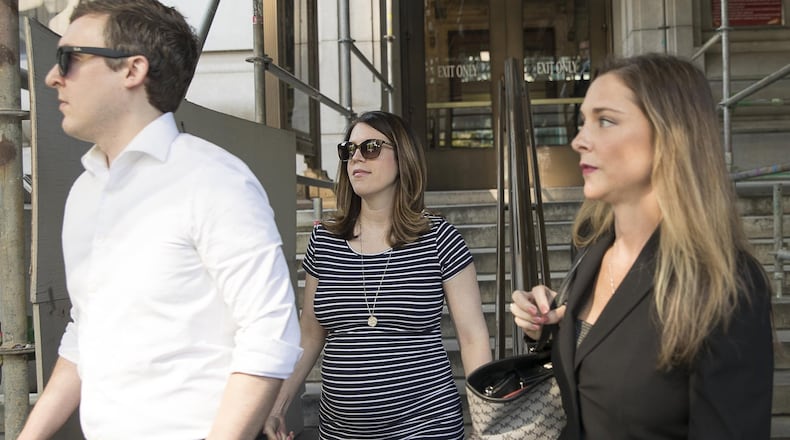Jenna Garland, a press secretary for former Atlanta Mayor Kasim Reed, could face trial as soon as September in the first-ever criminal case of alleged violations of the Georgia Open Records Act.
Garland made her first appearance Monday in a Fulton County courtroom and declined a plea offer from state Attorney General Chris Carr's office. Garland, who was press secretary during Reed's second term, is accused of ordering a subordinate in the city's watershed department in March 2017 to delay handing over public records to Channel 2 Action News that contained information damaging to Reed, his brother and other city officials.
She was charged in February with two misdemeanors.
Garland, 34, declined to speak to reporters as she arrived at the courthouse Monday with her husband and lawyer.
Garland previously pleaded not guilty via a court filing and has maintained her innocence in statements provided by her attorney. The former press secretary entered court facing a Monday deadline by Fulton State Court Judge Jane Morrison to either accept prosecutors' plea offer or to schedule trial.
Jennifer Little, Garland’s attorney, told the judge that prosecutors had provided her a substantial amount of evidence in the case and Little had not had time to review all of it. She also mentioned technical issues in reviewing the records.
“We are unable to accept that offer,” Little said. Terms of the proposed plea were not disclosed, though jail time is unlikely. Violations of the Georgia Open Records Act are punishable by fines of up to $1,000, however Morrison said Garland could face fines of up to $2,500 because she faces more than one citation.
Though Garland rejected prosecutors’ offer, Morrison said Garland also could make a “blind plea.” In that case, she would not know her potential punishment in advance.
Asked if she understood her choices, Garland said, “I understand.”
“We will go forward with either a blind plea or a trial,” said Morrison, who told both sides she wanted the case finished as early as September but no later than the year.
Carr ordered a GBI investigation of the Reed administration's handling of open records after reporting by The Atlanta Journal-Constitution and Channel 2 showed Garland instructed a watershed official to delay production of water bills to Channel 2.
In text messages the AJC and Channel 2 later obtained and published, Garland ordered a subordinate to “drag this out,” “be as unhelpful as possible” and “provide the information in the most confusing format available.”
Garland also instructed the subordinate to “hold all” records until a Channel 2 producer asked for an update. Those text exchanges form the basis for the two citations.
Georgia’s sunshine laws were written to ensure that governments remain accountable to citizens. State law requires public agencies to respond to records requests within three days and provide records as soon as they are available. In 2012, a criminal statute was added to the law.
Greg Lisby, a communication professor at Georgia State University and expert on the state’s open records law, said the case against Garland carries symbolic weight and should be an example used to dissuade other government officials from violating the law.
“This should resonate with every member of government on any level because we are all, me included, are working for the public,” he said.
Our Reporting
The AJC and Channel 2 Action News reported in March 2018 on texts by Jenna Garland, a press secretary for former Mayor Kasim Reed, that showed she ordered a subordinate a year earlier to delay a Channel 2 request for water billing records. State Attorney General Chris Carr opened a criminal investigation of the city’s open records practices following the reports. In February, Carr announced citations against Garland, the first-ever criminal complaint filed for alleged violations of the Georgia Open Records Act.
About the Author
Keep Reading
The Latest
Featured








